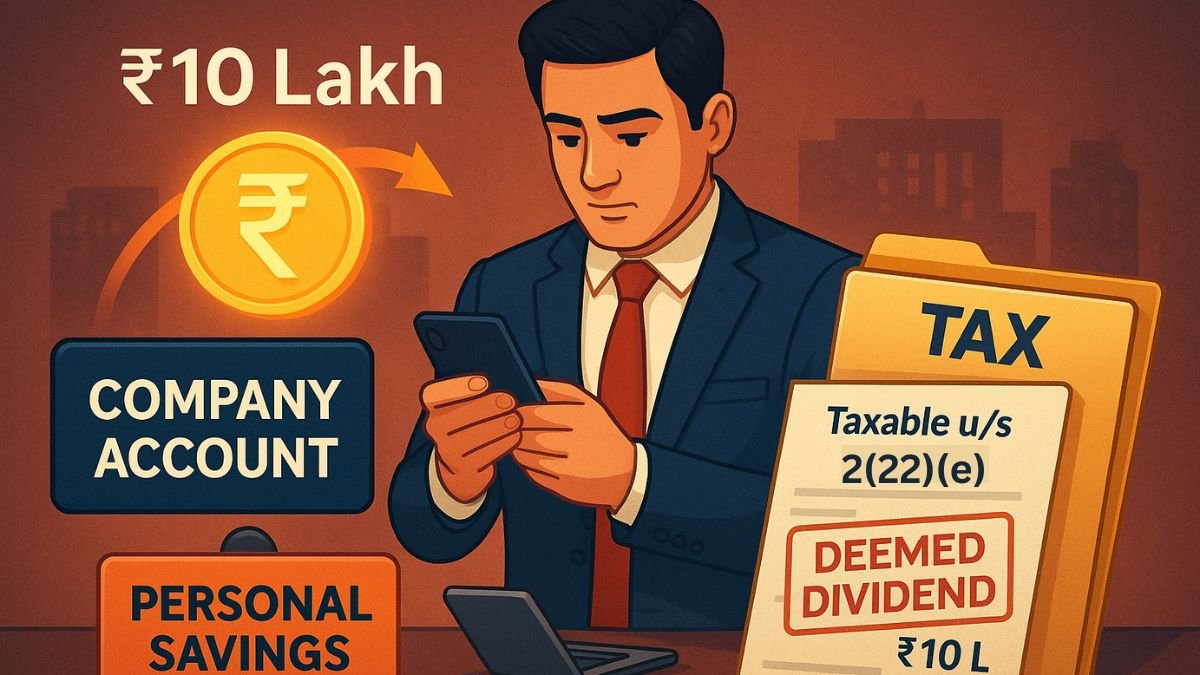
Dividends That Don’t Look Like Dividends
Not all dividends look like traditional cash payouts. Some are cleverly disguised as loans or advances to significant shareholders. That’s exactly what Section 2(22)(e) of the Income Tax Act is meant to stop.
Yes, deemed dividend u/s 2(22)(e) is taxable in the hands of the shareholder even if no formal dividend has been declared. It’s a legal provision designed to ensure corporate funds aren’t misused under the guise of temporary advances.
Let’s dive into what it means—and how it affects your tax filings.
📘 What is Section 2(22)(e) of Income Tax Act?
In a nutshell, Section 2(22)(e) covers a scenario where a closely held company (not publicly listed) gives a loan or advance to:
- A shareholder holding at least 10% voting power, or
- Any concern (like a firm or HUF) in which that shareholder has a significant interest
In such cases, even though it’s structured as a loan, the Income Tax Act treats it as a dividend—specifically, a deemed dividend.
So, there’s no dividend declaration, no board resolution, and yet the taxman treats it as income in the shareholder’s hands. "
📌 Why Was This Provision Introduced?
Deemed dividend tax falls under the Income Tax Act’s Section 2(22)(e) as a way to prevent the misuse of corporate funds.
Here’s the logic:
Promoters of closely held companies often take out money from company accounts in the form of loans instead of dividends to:
- Avoid Dividend Distribution Tax (now replaced by taxing shareholders)
- Delay personal income tax payment
- Reduce the compliance burden temporarily
But the tax authorities were quick to spot the loophole—& thus came Section 2(22)(e) to close it. "
🧑⚖️ Who Does It Apply To?
- The Company: Must be a closely held company (i.e., not listed on a stock exchange)
- The Shareholder: Must own ≥10% voting power
- The Transaction: Must be a loan, advance, or payment on behalf of or for the individual benefit of the shareholder
Also, note that the company should have accumulated profits at the time of granting the loan.
💡 Example for Clarity
Let’s say Rohit owns 15% shares in XYZ Pvt Ltd.
XYZ Pvt Ltd gives Rohit a loan of ₹5 lakhs for personal purposes. The company has ₹50 lakhs in accumulated reserves.
Although there is no dividend declaration, the ₹5 lakhs is treated as a deemed dividend under Section 2(22)(e), and Rohit, the shareholder, is taxed accordingly.
💰 How Is It Taxed?
Here's the twist:
- The tax liability falls on the shareholder, not the company
- The entire amount of the deemed dividend is added to the income of the shareholder under the head "Income from Other Sources"
- It is taxed at the applicable slab rate for the individual
That’s why it’s important to differentiate between genuine business loans and disguised payouts.
🔍 Exceptions to the Rule
Not every loan is a deemed dividend. Here’s when Section 2(22)(e) does not apply:
- If the company is not closely held
- If the shareholder holds less than 10% of the voting power
- If the payment is made in the ordinary course of business & lending is part of the company’s regular operations
- If there are no accumulated profits in the company at the time of giving the advance
📄 Documents You Should Keep
If you’re a significant shareholder or director in a private company, ensure you maintain:
✔️ Board minutes approving loans
✔️ Loan agreements (if any)
✔️ Records of purpose/use of funds
✔️ Ledger entries and repayments (if claimed to be business-related)
The Income Tax Department often raises queries if such advances are made close to the end of the financial year.
⚠️ Legal Controversies and Clarifications
Section 2(22)(e) has been the subject of many court rulings, especially around:
- Whether loans to HUFs count
- Whether repayments negate taxation
- Whether a concern (firm or LLP) where the shareholder is a partner/member gets covered
Recent rulings lean toward strict interpretation, focusing on the ultimate benefit to the shareholder.
❓ Common FAQs
- Is the deemed dividend under Section 2(22)(e) applicable to loans to employees?
No, unless they are significant shareholders meeting the conditions. - Is repayment of the loan relevant to taxability?
Not directly. Even if the loan is repaid, the taxability arises in the year of disbursement. - Can this apply to inter-corporate loans?
Only if the recipient is a concern where the shareholder has a substantial interest, not just any company.
📘 Section 2(22)(e) in Hindi (Quick Translation)
"धारा 2(22)(e) के तहत यदि कोई निजी कंपनी अपने प्रमोटर या 10% से अधिक वोटिंग पावर वाले शेयरहोल्डर को लोन देती है, तो उसे डिविडेंड माना जाता है और उस पर टैक्स शेयरहोल्डर को देना होता है।"
🧾 Summary Table
|
Criteria |
Section 2(22)(e) Rule |
|
Type of Company |
Closely held |
|
Shareholding Required |
≥10% voting power |
|
Taxed In Hands Of |
Shareholder |
|
Treated As |
Deemed Dividend |
|
Excluded Cases |
Public companies, routine business loans |
✅ Final Thoughts
Section 2(22)(e) of the Income Tax Act is a clever & crucial anti-avoidance measure. It ensures that companies can’t just hand out corporate funds to shareholders & call it a “loan.” If you're a shareholder or director in a closely held company, remember:
Deemed dividend u/s 2(22)(e) is taxable in the hands of the shareholder, & the deemed dividend tax falls under the Income Tax Act’s Section 2(22)(e)—a provision aimed at preventing the misuse of corporate funds.
💬 Need help classifying loans or avoiding Section 2(22)(e) traps?
Talk to a tax expert at CallMyCA.com & protect your business from unwanted surprises.











